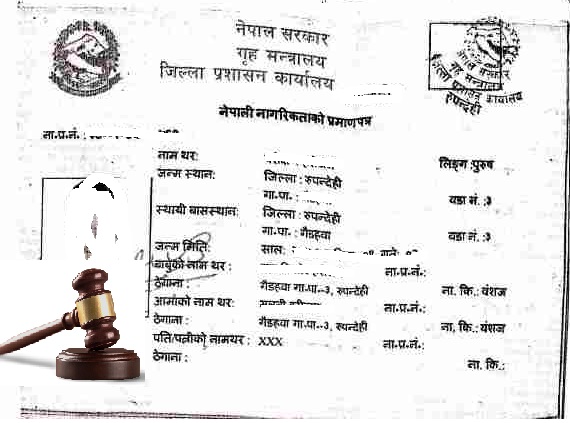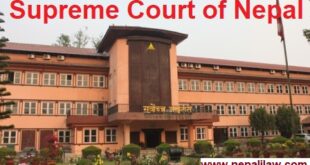The Supreme Court said that all government bodies should take it seriously to the citizenship and right to identity. The citizenship of any person is linked to his/her life, identity, and existence.
In the case of Kavita Aaganja vs. Jhaukhel VDC et all (NKP 2077, Vol. 1, DN 10424), Supreme Court has taken seriously to the right to citizenship and identity.
Supreme Court (SC) observed that it is not necessary to form a negative opinion on the basis of unproven arguments just because someone is lightly opposed.
The intention of the constitution and the law made under it that no one should be stateless.
SC elaborated that once something has come to the notice of the state, it is imperative to reach a conclusion in due course. No one seems to be able to evade the obligation to complete any work on time. It is also a matter of good governance. Any public body must be accountable to the citizens when carrying out its work.
If a person submits an application to a publicly responsible body on an issue, an immediate decision must be made on whether or not to do so. When making a decision, the basis and reason should be clear.
The constitution stipulates that if a person’s father or mother is a citizen of Nepal at the time of his / her birth. Every minor who has no paternity or maternity address found in Nepal. The Nepali citizen is born in Nepal and resides in Nepal. He/she will be a citizen of Nepal on the basis of descent until his / her father or mother is found.
The system of granting citizenship on the basis of descent even to a person who is unable to do so is not a rhetorical arrangement.
SC also focused that implementing these provisions is a matter within the duty of all concerned bodies. Opposition respondents in writing or in writing do not seem to be able to make any claim that these appellants are ineligible for Nepali citizenship, children of their foreign parents or not permanent residents of the State of Nepal.
The Constitution of Nepal states that those who have been born in Nepal and have resided in Nepal without the identity of their father or can obtain citizenship on the basis of which the Nepali mother can obtain citizenship on the basis of the facts mentioned in the petition.
SC strongly stated that after Kavita Aaganja filed application at concerned local body for recommendation for the purpose of obtaining Nepali citizenship. The concerned body is not formal documented. If no action is taken for a long time, she will have to remain stateless for a long time. She has been depriving many fundamental and legal rights, including jobs, voting, higher education and scholarship.
Even though it is more than ten years since the petitioner filed the petition. She is still in a stateless state. Until the body decided on the legal basis if the relationship mentioned in the application submitted by her, is genuine or not. It is not possible for any reason to remain undecided on any issue for such a long time. No one can be relieved of his responsibilities by blaming others.
SC also instruct that a people’s representative body should work with positive thinking. Even if someone adopts the wrong path. It is duty of such representatives to follow the right path. The representatives or civil servants must realize pain of having to spend decades without a citizenship certificate.
Apex Court observed that Making one’s office people-oriented, accountable and responsive and keeping it within efficient management and discipline, ending the obligation of any service recipient to visit the office again and again is the initial stage of the concept of good governance. If this is not done, the efficiency and responsibility of such responsible people’s representatives and employees will be questioned.
There is no written reply Kavita Aganja is a foreign national or the alleged surgeon. The concerned ward office does not claim that it is not possible to recommend citizenship due to lack of qualification to get Nepali citizenship.
Haribhakta Aganja mentions that Kavita Aganja is his daughter, the same thing is mentioned in the character certificates in the school. If the appellant is a holder of a different qualification on the basis of the constitution. There is no impediment in making the same recommendation.
Therefore, the order of the appellate court dated 2069-10.3 did not seem to be in line with the law of dismissal of the petitioner on the basis of the alleged surrogacy without the signature and office seal of the employee and without the presence of the concerned party.
Supreme Court reversed the order of the Patan Appellate court dated 2069-10.3. SC also issued mandamus order in the name of the opponents. To decide according to the law and inform the petitioner. If appellant Kavita Aaganja brings a formal application for the recommendation of citizenship certificate. The Ward office must complete the entire process as per the law within 30 days from the date of receipt of the application without any prejudice. If there is not any objective basis and reason for making a recommendation. Ward office must inform to the petitioner.
Therefore, Supreme Court is regularly taken seriously the issue of right identity of citizen.
 Nepali Law A complete legal information portal
Nepali Law A complete legal information portal

